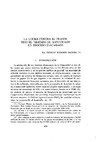Please use this identifier to cite or link to this item:
https://accedacris.ulpgc.es/jspui/handle/10553/71323
| Title: | La lucha contra el fraude tras el Tratado de Amsterdam | Authors: | Navarro Batista, Nicolás | UNESCO Clasification: | 5603 Derecho internacional 560506 Derecho fiscal |
Keywords: | Faude Europa Autonomía financiera |
Issue Date: | 1998 | Journal: | Revista de Derecho Comunitario Europeo | Abstract: | Cette étude examine les différents mécanismes articules par la Communauté Européenne pour lutter contre le fraude et pour proteger ses intéréts financiers. On y analyse la jurisprudence du Tribunal de Justice sur le principe de coopération loyale, sur l'obligation d'efficacité et sur les sanctions administratives que la Communauté peut adopter, en méme temps qu'on y étudie la reforme introduite par le Traite d'Amsterdam (art. 280 TCE).
L'évolution du droit communautaire est tres positive. La Communauté Européenne a adopté une approche globale lui permettant de développer tous les aspects de la lutte contre le fraude: l'information, le controle, la coopération entre les États, l'assistance des États non-membres de la Communauté, les sanctions administratives et la récupération des aides. C'est ainsi que parallélement a la stratégie préventive, l'obligation d'information qui releve des États-membres a été améliorée, les méthodes
et les organes de controle ont été renforcés et les compétences de la Commission ont été précisées. La collaboration avec les États non-membres a experimenté une avance significative. Le Droit communautaire souffre, cependant, d'un clair manque d'uniformité puisque chaqué secteur (la politique agricole, les fonds structurels...) posséde des regles spécifiques.
Cette étude met en évidence, d'autre part, la deficiente application des mesures. Dans la pratique, les États n'agissent pas avec la rigueur nécessaire et manquent á leur obligation d'information, ne respectent pas le nombre ou la quantité des controles et négligent le devoir de collaboration et d'assistance mutuelle. Pour cette raison, les États devraient encoré faire des efforts pour lutter contre le fraude afin d'améliorer la gestión des ressources financiéres communautaires, d'assurer une corréete mise
en oeuvre des politiques communautaires et de mener á bien le prochain élargissement de l'Union Européenne. This study examines the different mechanisms established by the European Community to fight against fraud and to protect its financial interests. It analyzes the jurisprudence of the Court of Justice regarding the principie of loyal cooperation, the obligation to be effective, the administrative sanctions approved by the Community, as well as the reform carried out in accordance with the Treaty of Amsterdam (art. 280 TCE). The evolution of Community law has been very positive. The European Community has adopted a global approach that has permitted the development of all aspects of the fight against fraud: information, control, cooperation between member States, the assistance of non-member States, administrative sanctions, and the recovery of aid. Thus, together with preventive strategy, mesures regarding member states' obligation to inform has improved, the methods and instruments of control have been strengthened, and the competences of the Commission have been more clearly defined. There has also been significant progress in the collaboration of non-member States. Despite this, Community law is still plagued by a striking lack of uniformity since each field (agricultural policy, structural funds, etc.) has its own rules and regulations. Moreover, this study also clearly indicates that the application of these measures is inadequate. In practice, the States are not strict enough in enforcing rules, are lax as to the quantity or quality of controls, and fail to fulfill their obligations regarding collaboration, information-giving and mutual assistance. Consequently, the States should make a greater effort to fight against fraud in order to improve the management of the Community's economic resources, to guarantee the correct carrying out of Community policy, and to successfully undertake the upcoming enlargement of the European Union. |
URI: | https://accedacris.ulpgc.es/handle/10553/71323 | ISSN: | 1138-4026 | Source: | Revista de Derecho Comunitario Europeo [ISSN 1138-4026], n. 2 (49), p. 429-472 |
| Appears in Collections: | Artículos |
Page view(s)
78
checked on Aug 31, 2024
Download(s)
46
checked on Aug 31, 2024
Google ScholarTM
Check
Share
Export metadata
Items in accedaCRIS are protected by copyright, with all rights reserved, unless otherwise indicated.
